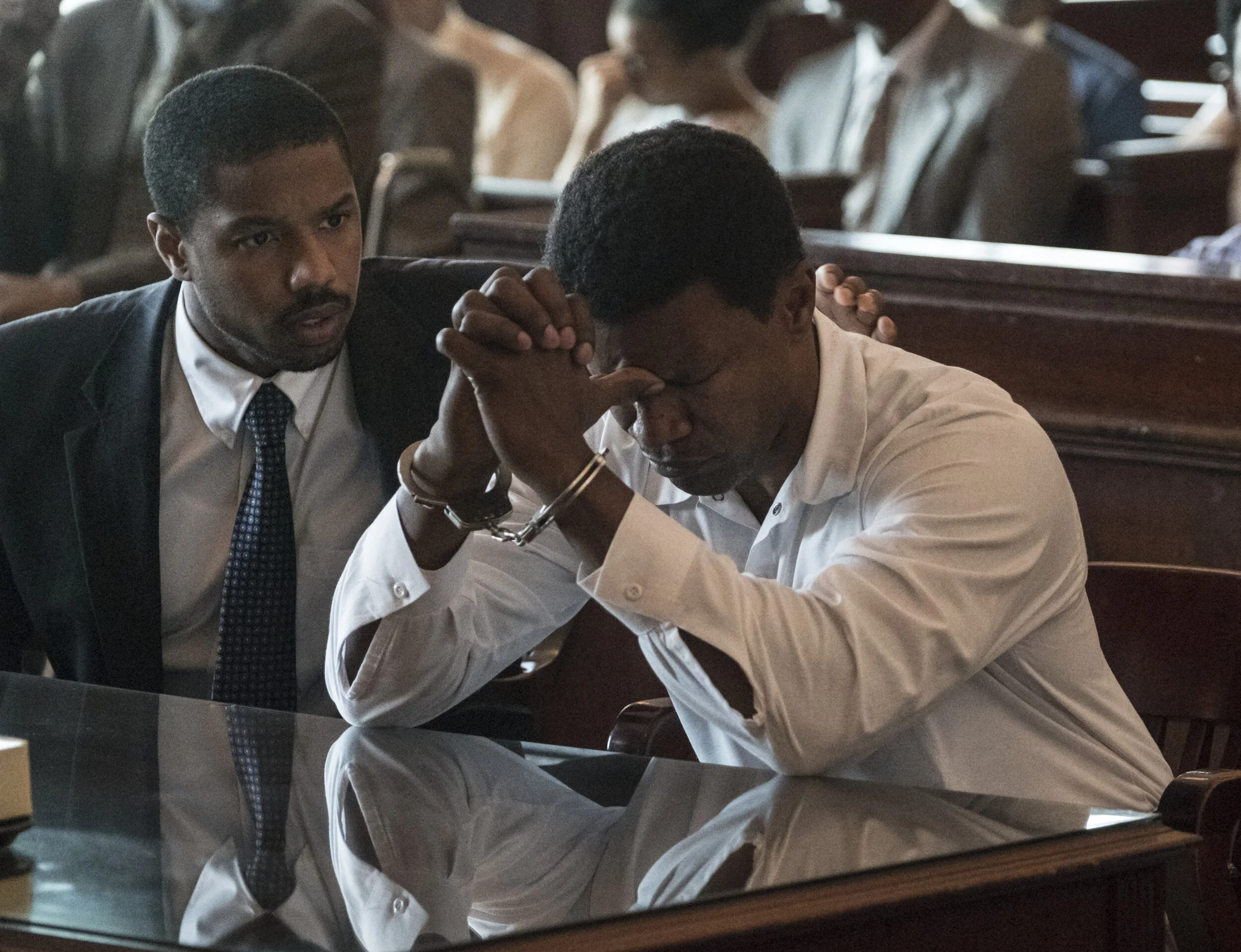MOVIE REVIEW: Just Mercy
Gala Presentation and Black Perspectives selection of the 55th Chicago International Film Festival
JUST MERCY-- 4 STARS
Admittedly so, there is a great deal about Just Mercy that feels, for lack of a better word, formulaic. Legal movies have their mimetic blueprint elements from the courtroom theatrics to the political commentary. The performances reach for showy heights and the empathy levels are turned to 12. Why? It’s because it works. When movies of this tone do not work is when some of those tried-and-true elements are forced or unrealistic. The formula is overmixed or overcooked. The melodrama invades over earned sentiment.
There is a certain steadiness to Destin Daniel Cretton’s new film that pushes back those gaudy tendencies. Its central real-life figure Bryan Stevenson is not the firebrand type most legal movies typically adore and request. Played by Michael B. Jordan, in a fitting and matured leading role for the muscled actor, Stevenson is not made to be something he is not. His real-life story and iron will principles are not smudged just to show a little pizzazz for the sake of pizzazz.
This steadiness to not explode with all the rage you think is coming is precisely a strength and not a boring detriment to Just Mercy. Simply put, the case at hand and the true story provide the magma for the movie. Around Mr. Stevenson, the passionate ensemble of Jamie Foxx, Brie Larson, Rafe Spall, Tim Blake Nelson, O'Shea Jackson Jr., and Mudbound’s Rob Morgan have all the flash one needs to balance the entertainment value. Steady becomes a compliment. Steady is what more of these movies should be in the first place.
Just Mercy tells the beginning of the Bryan Stevenson story as a newly-minted Harvard lawyer in the late 1980s. Rather than stay north and chase paychecks, Bryan relocates to Alabama to return to the death row of the Alabama prison system where he worked as a student for the Southern Center of Human Rights. After the federal government eliminated funding public defense of death-row cases, Stevenson founded the non-profit Equal Justice Initiative in Montgomery with operations director Eva Ansley, embodied with s-word-swinging frankness by Brie Larson.
Together, they reopened cases, earned the trust of jaded convicts, sat down at dinner tables of hopeful family members, and knocked on doors high and low to advocate against the death penalty’s ticking clock. The case featured in Just Mercy is that of the wrongfully convicted Walter McMillian. Played with infinite mettle by Oscar winner Jamie Foxx, McMillian has been imprisoned for murder on flimsy evidence and coerced witnesses. Appeals have fallen on deaf ears until Bryan joins the battle.
LESSON #1: “THERE’S ALWAYS SOMETHING TO DO”-- The work of Stevenson and his group went beyond any cursory “just want to help” nudges and “heart in the right place” cliches. They brought a tireless work ethic to dig into flawed cases. Stevenson possessed an integrity to keep going until the last possible second in the most dire of eleventh hours.
LESSON #2: BE A GOOD FRIEND-- Where and how Bryan Stevenson found his virtue is in connecting beyond his cold and objective job title. He was challenged “what are you going to do different?” He grew to know and befriend his clients. Couple this with Lesson #1’s energy and he found their lives to be more meaningful than a won-loss record or docket label. Skilled enough to help as a good lawyer is one thing. Care enough to really help is another. That is the “mercy” matching the film’s title.
The converging dynamics between Jordan and Foxx are the empowering traits of Just Mercy. Jordan’s stalwart composure performs with power next to the dire nerves of Foxx. Neither are aiming for Denzel Washington-like tirades of rank indignation. They don’t have to. Instead, they impress, again, with measured steadiness. The two offer excellent and award-worthy performances within this scope of patience. Larson is ample and game support, but this movie relies heavily and appropriately with Jordan and Foxx.
Just Mercy, adapted from Stevenson’s bestselling 2014 nonfiction memoir by Cretton and his The Glass Castle writing partner Andrew Lanham, makes no bones about addressing racial inequality in the Alabama justice system, especially at the death-row level. There is a “guilty from birth” diatribe that is scathing and affecting. The McMillian case shocks and surprises where dramatization only accentuates the preposterousness we rightfully root against. Could the film be louder in the performance and commentary departments? Certainly, but then you lose some respectable authenticity and approachability.
LESSON #3: ACHIEVING JUSTICE-- The verb choice that is most frequently paired with the core value of justice in this movie is a fascinating and positive selection. The synonyms of “achieve” evoke the actions of “attain,” “realize,” “gain,” “win,” and, ultimately, “earn.” The goal is the equity, fairness, and uprightness that is justice. Just Mercy is an unabashed crowd pleaser for this effort and one that earns appreciation all its own. It is a worthy winner of the National Board of Review’s Freedom of Expression Award for 2019, join company such as Selma, The Insider, First They Killed My Father, Pariah, and Beasts of No Nation.
LOGO DESIGNED BY MEENTS ILLUSTRATED (#848)



